Japanese Video Games Effect on Western Gaming Culture
Overview of Japanese Video Games:
Japanese game creators have significantly impacted the gaming industry, and their innovations have had a lasting impression on Western gaming culture. Japanese video games have completely changed the world, from the earliest arcade games to the most cutting-edge virtual reality offerings. This article examines the significant contributions that Japanese games have made to developing Western gaming culture. It does this by looking at essential games, trends, and the overall effects on game design and player expectations.
Japanese Games’ Early Effects
The Revolution of Arcades
Japanese games appeared in Western arcades in the late 1970s and early 1980s. Pioneering titles like Taito’s Space Invaders (1978) and Namco’s Pac-Man (1980) altered the arcade gaming experience. The industry adopted these games’ novel gameplay elements, which included the high score system and maze navigation.
The Ascent of Sega and Nintendo
The rise of Nintendo and Sega, two Japanese behemoths that would significantly influence the development of Western gaming culture, occurred in the late 1980s and early 1990s. With its inventive level design and character-driven narrative, Nintendo’s Super Mario Bros. (1985) revolutionized platform gaming. Sega’s Sonic the Hedgehog (1991) responded with lightning-fast platforming and an endearing character, igniting a rivalry that would spur gaming innovation and competitiveness.
RPGs from Japan: An Emerging Genre in the West
Final Fantasy and Dragon Quest Arrive
Japanese role-playing games, or JRPGs, started to gain traction in Western markets in the 1990s. Square Enix (formerly Squaresoft) created Final Fantasy VII (1997), a game-changing title with 3D graphics, deep character development, and theatrical storytelling. Similarly, Dragon Quest VII (2000) introduced the genre’s vast environments and turn-based combat to Western consumers.
The Development of Gamer Physics
Turn-based combat, sophisticated character growth systems, and intricate stories are just a few of the innovative mechanics and narrative styles Japanese role-playing games introduced to Western gamers. These components were essential to many Western role-playing games, impacting games like Mass Effect (2007) and The Elder Scrolls IV: Oblivion (2006). The popularity of these Western role-playing games can be ascribed to the groundwork laid by their Japanese equivalents.
The Influence of Art and Vision
Manga and Anime Styles
Western game design and visual storytelling have been greatly influenced by anime and manga aesthetics, frequently included in Japanese games. Japanese animation and comics influence the vivid visual styles and inventive storytelling methods found in games such as Persona 5 (2016) and Ni no Kuni II: Revenant Kingdom (2018). This impact also extends to Western video games, whose creators increasingly use comparable characters and art styles to appeal to a worldwide market.
Novel Approaches to Game Art and Design
The inventiveness and creativity of Japanese game developers are well known. Open-world exploration and original visual techniques abound in both Okami (2006) and The Legend of Zelda: Breath of the Wild (2017), which have revolutionized game design and inspired Western developers to explore new visual and gameplay possibilities.
Pioneering Gameplay Mechanics and Game Mechanics’ Effect on Japanese Games
Numerous gameplay elements first seen in Japanese video games have since spread throughout the industry. For example, the tight atmosphere and resource management of Resident Evil (1996) popularized the survival horror genre, which in turn influenced Western titles such as Dead Space (2008) and The Last of Us (2013). Comparably, the 1998-launched Metal Gear Solid series pioneered cinematic presentation and stealth gameplay, influencing Western franchises like Splinter Cell (2002) and Assassin’s Creed (2007).
Impact on Trends in Game Development
Japanese developers have also led innovative trends in game production. Beginning in 2011, the Dark Souls series introduced complex world-building and a severe difficulty level that impacted several Western games, such as Bloodborne (2015) and Elden Ring (2022). This shift in gameplay, which is more in-depth and engaging, is indicative of the larger influence of Japanese design principles on the international gaming market.
Western gaming communities and Japanese game culture
Japanese Video Games’ Adoption in Western Markets
Japanese video games have been a massive hit in Western markets, as seen by their critical and general praise. Super Smash Bros. Ultimate (2018) and Animal Crossing: New Horizons (2020) are two games that have attracted much interest and fans outside of Japan, demonstrating the attraction of Japanese game design and culture worldwide.
Localization and Cultural Exchange
The localization of Japanese video games has also greatly aided in bridging cultural divides between Japan and the West. For localization to be effective, cultural allusions must be modified in addition to language translation to appeal to Western consumers. This procedure has increased awareness of Japanese gaming culture and helped Japanese games reach a wider audience.
Prospects for the Future and Persistent Impact
The Gaming Industry’s Increasing Globalization
The effect of Japanese video games is probably going to last and change as the gaming business becomes more international. The growing number of international gaming events and platforms, along with the growing cooperation between Japanese and Western developers, will make the sharing of ideas and technologies even easier. Japanese titles will shape and inspire the future of gaming, helping create a more vibrant and varied sector.
Japanese Games’ Legacy
Japanese gaming culture has left a lasting imprint on Western gaming culture. Japanese game developers have always been at the forefront of pushing the limits of what is possible in games, from their early influence on arcade gaming to their part in influencing modern game design. Japanese video games will continue to impact people worldwide, even as new trends and technology develop.
In summary
Japanese games have had a significant and long-lasting impact on Western gaming culture. Japanese game creators have revolutionized the gaming world with inventive gameplay mechanisms, unique visual styles, and gripping storylines. The history of Japanese video games will always be an essential aspect of the gaming experience, influencing new gamers and producers as the industry develops.











Leave a Reply